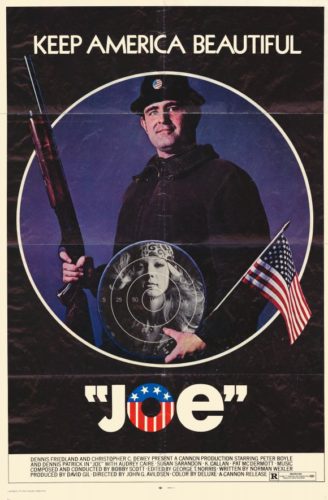 Cary Edwards at BrightLights:
Cary Edwards at BrightLights:
Some people came out of theatres loving a character who had voiced their concerns about society (loving it enough that an LP of Joe’s speeches from the film was released). Others shouted threats at the screen: “We’re coming for you, Joe”; threats real enough for Peter Boyle to try to establish the difference between himself and his screen persona in several magazine interviews, and distancing himself from violent roles in the future (Durham, 1970). But what to make of this divisive film after 34 years? Does it still have the power to split an audience, or does time give us the distance to appreciate it anew? (…)
The film echoes the Puritan captivity narrative and westerns, like The Searchers, but concludes in a way that exposes the moralistic lies behind those archetypes. Ethan Edwards might relent at the end and hug his niece. Bill Compton shoots his daughter in the back. And no wonder – this film exposes everyone as a sham, white collar, blue collar, and hippie alike.
The hippies, despite all their counterculture slogans for peace and love, are happy to steal when it comes to getting high – besides, getting one back on the “squares” is entirely justified. Their confused depiction seems typical of the time; it recalls the Linny Raven character in Coogan’s Bluff, as if all the contradictions of the era (peace campaigns and campus riots) are rolled into one single stereotype. (…)
In 1976, Taxi Driver was released, concerning a spiritual descendent of Joe, Travis Bickle. Boyle appears briefly as Wizard, an older taxi driver who attempts to counsel Bickle. Boyle’s performance is a clear counterpoint to Joe, with Wizard praising liberal values. His advice, of course, fails and the narrative is restaged, but this time the girl is rescued (whether she wants it or not). The captivity narrative returns, the confusion remains. Is Bickle a saviour? His costume confuses, a gunslinger with a mohawk. The good guys, the bad guys, all blend into one. (…)
Joe was clearly a film born out of its era, hitting the zeitgeist at precisely the right moment. Several months before it was released, the action of the film was prefigured by the real-life murder, on May 7, 1970, of hippie daughter by Detroit railroad worker Arville Garland. Garland had had enough of his daughter’s new lifestyle and friends, and went to her university and shot them. Although Norman Wexler’s screenplay for Joe had been completed before the crime, the parallels were obvious, not least for the trial judge who instructed the defence and the prosecution to watch the film, and screened the jury to make sure they had not (Thomas, 2014). Like the fictional Joe Curran, Garland had many supporters too, receiving letters and gifts while in jail.
I wrote about Joe a few times at my old blog, where I noted that it was also shot and released before the Hard Hat Riots.
Boyle’s performance is fantastic, all the more so when you consider how difficult it might have been for that dedicated leftist (he was a “Fuck the Army” cast member) and former monk to mouth his lines.
PS: I’m pretty sure The Searchers itself “exposes the moralistic lies [sic?] behind those archetypes” already, no?

